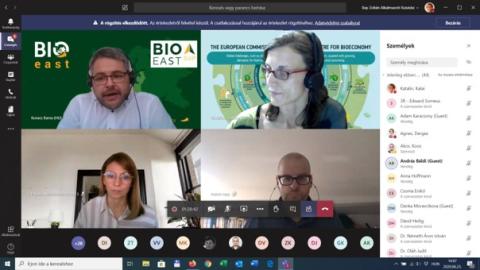
Knowledge sharing for a sustainable and circular bioeconomy

About this good practice
In the bioeconomy, a major barrier is the lack of accessible knowledge among stakeholders, hindering innovation and effective policy implementation, especially at regional and local levels.
The Hungarian Bioeconomy Cluster developed a replicable model to address this: a series of knowledge-sharing sessions to educate and mobilize stakeholders. Launched initially as a webinar series, it promotes understanding and collaboration.
The model includes:
• Multi-session structure: Focusing on various bioeconomy aspects, from high-level strategic insights to practical applications.
• Tailored content: To meet the specific needs of diverse stakeholders, offering informative and actionable content.
• Collaborative approach: Involves multiple partners to foster cross-sector collaboration and integrated bioeconomic strategies.
• Scalable and adaptable: Flexible approach for different regional or national contexts, through webinars, workshops, or conferences.
The "Sustainable and Circular Bioeconomy" webinar series in June 2020 exemplified this model, successfully mobilizing a wide range of stakeholders and facilitating cross-sectoral dialogue on bioeconomic opportunities and challenges.
Beneficiaries:
• participants: agricultural and industrial actors, experts, relevant chambers, research institutes, higher education institutions and ministries
• wide range of sectors: agriculture, forestry and wood, food, energy, waste treatment and processing, the RDI sector and education
Resources needed
An activity of the Power4Bio H2020 project (under Grant Agreement No. 818351) to foster dialogue between key regional actors for a cross-regional cooperation network.
Personnel costs - human resources: 3 persons involved in the organisation of the event at Bay Zoltan Nonprofit Ltd. (part time).
Evidence of success
It mobilised 45-50 attendees from sectors like agriculture, energy, waste processing, representing regions across Hungary and internationally (Spain, Slovakia, Romania, Croatia). This broad engagement demonstrates its success in fostering cross-sectoral dialogue with participation from experts, government bodies and academia. The model’s effectiveness in attracting diverse stakeholders highlights its potential for regional adaptation to support bioeconomic collaboration and policy development.
Potential for learning or transfer
This practice is highly relevant for other regions due to its structured, adaptable model and proven capacity to enhance collaboration across diverse stakeholders. By tackling the common challenge of inaccessible knowledge, it bridges the information gap that often hinders bioeconomic development. It also demonstrates how public authorities can better engage stakeholders through structured dialogue on regionally relevant bioeconomic topics.
For public authorities, the success of this practice suggests a framework for policy improvement through informed and engaged networks. Authorities can use similar models to disseminate information on sustainability policies, build cross-sector relationships, and support public and private sector alignment on bioeconomic initiatives. By adopting this approach, they can stimulate regional innovation, facilitate compliance with environmental regulations, and foster economic resilience through bioeconomic development.
Further information
Images
Documents
Programme_bioeconomy_webinar_Hungary.pdf
Webinar_concept_note.pdf
Website
Good practice owner
You can contact the good practice owner below for more detailed information.
